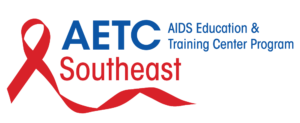Southeast AETC Oral Health Training & Resource Center
Innovative Training and Resources to Close The Gap Between Overall Health and Oral Health
The SE AETC recognizes that HIV care is complex and challenging. Oral health providers, primary care providers, and other health professionals especially in rural communities affected by HIV – often lack the resources to close the gap between overall health and oral health. The SE AETC offers innovative training and information to close this gap and improve health outcomes and quality of life for patients.
Oral Health providers, Primary Care providers, and other health professionals especially in rural communities affected by HIV often lack the resources to close the gap between overall health and oral health. The Southeast AIDS Education and Training Center recognizes that HIV care is complex and challenging. The purpose of this training is to close this gap and improve health outcomes and quality of life for our patients.
Helpful Links
- COVID-19 (Coronavirus): Resources for the Oral and Dental Care Team | Cochrane Oral Health
- Emergency Planning and Disaster Recovery Planning in the Dental Office | The American Dental Association (ADA)
- Guidance for Dental Settings | Centers for Disease Control and Prevention (CDC)
- HIVdent
- HIV Drug Interactions | University of Liverpool HIV
- Integration of Oral Health and Primary Care Technical Assistance Toolkit | HRSA
- National Institute of Dental and Craniofacial Research
Pocketcards
Publications
- COVID-19 in Patients with HIV: Clinical Case Series
- Early Virus Clearance and Delayed Antibody Response in a Case of Coronavirus Disease 2019 (COVID-19) With a History of Coinfection With Human Immunodeficiency Virus Type 1 and Hepatitis C Virus
- HIV-1 vaccination by needle-free oral injection induces strong mucosal immunity and protects against SHIV challenge
- Oral Immunization with HIV-1 Envelope SOSIP trimers elicits systemic immune responses and cross-reactive anti-V1V2 antibodies in non-human primates
Mark S. Schweizer, DDS, MPH is the Oral Health Director of the SE AETC. He is also an Associate Professor and the Director of Infection Prevention Programs at Nova Southeastern University College of Dental Medicine. Dr. Schweizer is a graduate of the University of Maryland College of Dentistry and Nova Southeastern University Master of Public Health program. He serves as Clinical Director of the Ryan White HIV Dental Program for Nova Southeastern College of Dental Medicine and Project Director of the Part F Dental Program with Care Resource in Fort Lauderdale, Florida. Dr. Schweizer is also a member of the Broward County Florida HIV Health Planning Council. He has more than 20 years of private practice experience and has lectured locally, nationally, and internationally on how dental providers can serve the needs of special populations and underserved communities.
HRSA’s AIDS Education and Training Center (AETC) Program supports national HIV priorities by building clinician and care team capacity and expertise along the HIV care continuum. The goal is to provide a comprehensive approach to HIV/AIDS education. HIV/AIDS is recognized as a growing problem in rural America. Rural counties in the U.S. and specifically the South and Southwest have high rates of persons with HIV. A study by the Rural Center for AIDS/STD prevention (2011) noted an increasing incidence of new cases and deaths from AIDS in the South. The prevalence rate of adults and adolescents living with AIDS in non-metropolitan areas is 99.5 per 100,000. In rural America, African-American men and women account for 50% of the AIDS cases, whites 38% and, Latinos 10%. The disproportionate impact of HIV in the South, particularly among targeted states, demonstrates a critical need to improve HIV prevention and education, and address factors that contribute to HIV disease in all regions, but particularly rural areas. Minority and rural areas are associated with social determinants that can trigger higher rates of HIV/AIDS, such as a lack of educational opportunities, poor economic position, poor access to healthcare, higher susceptibility to other forms of STDs, and substance abuse. The link between oral health and overall health is well established. In patients with HIV (PWH) this link is significantly more important as the increase in comorbidities is well documented. Patients engaged in oral health have improved health outcomes including retention in care, medication adherence, and viral load suppression.
